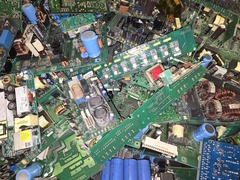"In 2022, an estimated 62 million tonnes of e-waste were produced globally." - World Health Organization
From E-Waste to New Product: The Lifecycle of Recycled Electronics Explained

Did you know that the global volume of e-waste is expected to grow to 74.7 million metric tons by 2030? Now imagine all those unwanted gadgets and devices piling up in landfills instead of being transformed into new products. Not only does this pose a severe environmental threat, but it also represents missed opportunities for resource recovery and economic benefits. But how do used electronics make the transition from waste to a new product?
At Midwest Computer Recyclers, we recognize the importance of understanding this transformation and its impact on businesses and the planet. As leaders in Computer and Electronic Recycling Services in Wausau, our goal is to educate and provide solutions to both reduce e-waste and create sustainable practices for businesses in Wisconsin.
In this blog post, we'll navigate the intricate journey of electronic waste to new products, explore the benefits and challenges of recycling, and provide actionable steps for businesses looking to implement greener practices.
Understanding E-Waste and Its Impact
What is E-Waste?
E-waste, or electronic waste, encompasses discarded electronic devices with no remaining useful life that end up as waste. This includes items like computers, televisions, cell phones, and more. Despite being called "waste," these discarded products still hold substantial value through the recyclable materials they contain.
Environmental and Economic Implications
The accumulation of e-waste poses significant environmental risks, as underscored by the Geneva Environment Network, such as soil and water contamination from toxic substances if not properly managed. Economically, failing to recycle e-waste means wasting valuable materials like gold, silver, and copper, which are essential for the production of new electronics. Engaging in responsible recycling practices not only mitigates environmental harm but also supports resource conservation and economic growth.
The Lifecycle of Recycled Electronics
Initial Collection and Sorting
The journey of recycled electronics begins with collection. At Midwest Computer Recyclers, we offer streamlined services for e-waste management, including easy drop-off and pick-up locations. Once collected, these items are transported to our facility, where they undergo rigorous sorting processes to separate recyclable materials from non-recyclable waste.
Dismantling and Processing
Once sorted, devices are dismantled to salvage valuable components. For instance, circuit boards are stripped of metals and reusable parts. Screens are carefully separated to extract rare earth elements. This intricate dismantling is crucial for efficient material recovery and maximizing the items' inherent value.
Material Recovery and Processing
Following dismantling, materials like metals, plastics, and glass undergo specific processing techniques to purify and prepare them for reuse. Metals are smelted and refined, while plastics go through granulation for new manufacturing purposes. The recycling process not only recovers materials but also reduces the need for virgin resources, contributing to sustainability.
Benefits of Recycling Electronics
Environmental Advantages
Recycling electronics facilitates the reduction of greenhouse gas emissions, saves energy, and conserves natural resources. By diverting e-waste from landfills, toxins are prevented from leaching into the environment, and vital metals are preserved for future use.
Economic Benefits
The recycling industry plays a pivotal role in job creation and economic growth. By handling e-waste in an organized manner, Midwest Computer Recyclers contributes to creating employment opportunities in refurbishment, recycling, and manufacturing sectors. Furthermore, recycling reduces the costs associated with producing new materials, passing savings onto consumers and companies.
Challenges in Electronic Recycling
While benefits are ample, electronic recycling presents challenges, such as the complexity of materials and the expense of disassembly and processing. Additionally, keeping up with the rapid pace of technological advancement demands continual adaptation within the industry.
How Businesses Can Implement Greener Practices
Conduct an E-Waste Audit
Start by understanding the scale of your company's e-waste generation. This audit will reveal areas where waste can be minimized and highlight opportunities for recycling.
Partner with Certified Recyclers
Engage with certified recycling companies like Midwest Computer Recyclers to ensure the responsible disposal of electronics. Our services include data destruction for sensitive information and compliance with industry standards.
Educate and Engage Employees
Promote awareness and participation among employees. By organizing e-waste drives or informational sessions, companies can foster a culture of sustainability.
Adopt Circular Economy Practices
Focus on reducing, reusing, and recycling within the company framework. Encourage the use of refurbished equipment and support the purchase of products made from recycled materials.
Powering a Greener Future with Midwest Computer Recyclers
Understanding the lifecycle of recycled electronics reveals a world of possibilities beyond mere disposal. It offers a compelling blueprint for conserving resources, reducing environmental impact, and unlocking economic benefits. By implementing sustainable e-waste management practices, businesses can play a pivotal role in cultivating a more sustainable future.
Are you ready to take the next step towards greener practices? Visit Midwest Computer Recyclers to explore our services or contact us for a consultation on how we can assist your business in e-waste management.